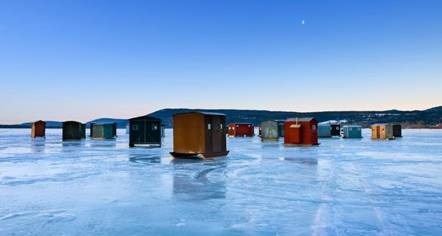In a move that is sure to meet stiff resistance from tourism outfitters, the Chief and Council of Nipissing First Nation (NFN) is calling on the Ministry of Natural Resources and Forestry (MNRF) to close the winter walleye fishery for the 2016-2017 ice fishing season as a temporary measure to address stressed walleye stocks.
This call comes as NFN closed its commercial fishery for the season on August 31, 2016, to remain within the recommended safe harvest level. NFN has also imposed a spring moratorium since 2004, during the annual spring spawn says a news release from NFN.
“Given the state of the fishery and our efforts to do our part to conserve walleye in Lake Nipissing, we are calling on everyone to make a short term sacrifice for the long term good of the lake,” said Chief Scott McLeod who has more than 25 years of experience working on fisheries issues for Nipissing First Nation.
“This doesn’t mean people can’t fish, but we are asking them to focus on other species, especially those that have healthy, abundant populations like yellow perch.”
The release says the NFN Council arrived at the request for closure of the winter recreational walleye fishery following careful review of biological data and consideration of the rights of its members under the Robinson-Huron Treaty of 1850, as well as legal decisions including the Sparrow and Commanda cases that described the “priority allocation” of fish resources.
“The Sparrow case of 1990 established the order of priority for harvesting of fish and game – namely conservation of the resource, the right to hunt or fish for subsistence purposes, harvesting for commerce then recreational harvesting. Our view is that we have done more than our fair share by developing and enforcing our Fisheries Law and now is the time for the rest of the users around the lake to do more as well,” said McLeod.
“Consider that there are nearly 4 times more ice huts on lake Nipissing than there are houses on NFN (3,000 huts vs. 800 houses), and that only 3% of the walleye in the lake are larger than the 46 cm slot size. This means the majority of the walleye caught by recreational fishermen must be released. Given that fish caught and released in the winter have a mortality rate of 20% (or 1 in 5), this is troubling. There is no doubt that the winter fishery is harming adolescent fish and negatively impacting the recovery of the walleye population,” added McLeod.
“NFN’s walleye fishery is closely monitored to ensure the sustainability of the lake’s resources. There are many stresses affecting the health of the lake, including climate change, pollution and invasive species, and we can no longer ignore the strain that the winter fishery puts on the recovery of the walleye population.”
"Nipissing First Nation has developed its own Fisheries Law and management regime that is recognized by the province of Ontario, and has demonstrated that an approach that respects the traditional role of First Nations as stewards of the resource can work," states the news release.
"Taking this precautionary step of closing the winter recreational walleye fishery accomplishes many objectives in addition to the shared goal of preserving a shared resource. It demonstrates understanding and support on the part of government and treaty partners toward the fishers of Nipissing First Nation, it takes pressure off the fish population and still allows people to enjoy winter angling."
NFN views closing the recreational winter walleye fishery not only as a sound measure based on science and data, but also as a gesture towards reconciliation. “Every effort was made to disconnect us from our identity, from taking our kids and putting them in residential school to harassing us when our grandmothers and grandfathers tried to feed their families. But we are still here and if the Ontario government is sincere in moving towards reconciliation, they will work with us and close the walleye fishery for the winter,” said McLeod.



